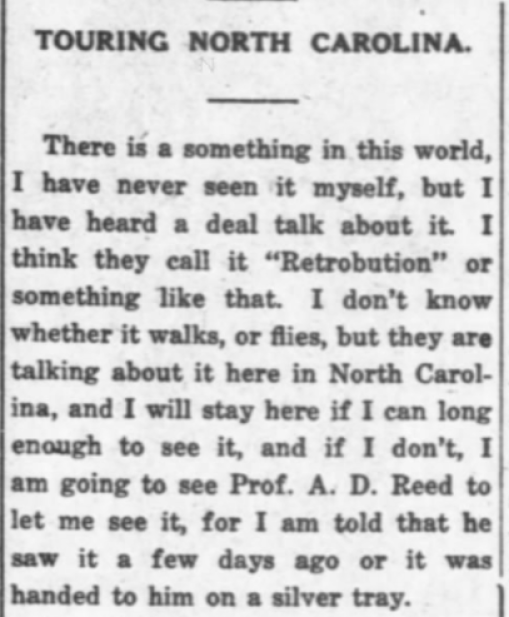Beyond the record of her astounding heroics leading up to the Colored Graded School boycott, Mary C. Euell left little trace of her short time in Wilson.
Mary C. Euell.
A recently discovered clue describes Euell as a native of Washington — presumably, D.C. Other evidence suggests she left teaching, returned briefly to her hometown, then obtained a pharmacy degree and opened a business in Asheville, North Carolina.
Two Mary C. Euells appear in Washington, D.C., census returns in the early twentieth century. One was born about 1880, most likely in Virginia, to Minnie Euell Gasbea. The other — the one I believe was our Mary C. Euell — was born about 1890, most likely in Washington, to Henry and Mary C. Euell. Here’s what we know about both.
- Mary C. Euell, hero
Henry Euell married Mary Allen on 12 August 1882 in Washington, D.C.
In the 1910 census of Washington, D.C.: at 1223 Linden Street, Henry Euell, 49, treasury department laborer; wife Mary, 40; children Oliver H., 26, treasury department laborer, Henry C., 22, treasury department laborer, Mary C., 20, and Edgar H., 18; and grandchildren Oliver H., Jr., 18 [sic], and Earnest C., 3.
In the 1914 Washington, D.C., city directory: Euell Mary bds [boards] 909 44th ne [Henry and Edgar Euell were also listed at this address.]
Mary C. Euell’s mother, also named Mary C. Euell, died 1 April 1915.
The Evening Star (Washington, D.C.), 1 April 1916.
The 23 September 1917 edition of the Evening Star ran a report on salary increases for federal employees by name. Mary C. Euell received a promotion and raise from printer assistant at $1.75 per diem to operative at $2.00 per diem, plus 25 cents per hour. [This appears to be our Mary C., but if so, she quit the printing bureau gig immediately and moved to Wilson to teach. The slapping incident took place on 1 April 1918, and the boycott began on April 9. Euell wrote to W.E.B. Du Bois on the 22nd and was in court on the 30th. There is no record of her in Wilson after that date.]
The 6 December 1919 edition of the New York Age reported Mary C. Euell as a dinner guest of Mr. and Mrs. Charles Jones on Bly Street. [This may be the other Mary C.]
In the 1920 Washington, D.C., city directory: Euell Mary C opr bu ptg [operator — bureau of printing] r 909 44th ne [Edgar and Henry Euell are also listed at this address.]
Between 1920 and 1925, Euell obtained a degree (or otherwise received training) in pharmacy. A report of successful board examinees listed Euell’s home as Kings Mountain, North Carolina, just west of Charlotte.
Druggists Circular, volume 69 (September, 1925).
Eight months later, as pharmacist in charge, she ran an ad in a Columbia, South Carolina, newspaper for the Enterprise Drug Company — “Get acquainted with our ‘If its not right bring it back’ System.”
Palmetto Leader (Columbia, S.C.), 22 May 1926.
She soon relocated to Asheville, however, where she operated the Southside Pharmacy.
In the 1928 Asheville, N.C., city directory: Euell Mary C (c) Southside Pharmacy h 34 Victoria av. The pharmacy was one of three businesses located at 187 Southside Avenue. (The business is not listed in the 1927 directory.)
Mary C. Euell’s brother Oliver Holmes Euell died 18 May 1928 in Washington, D.C.
The Evening Star (Washington, D.C.), 21 May 1928.
On 9 August 1928, Mary C. Euell died in Asheville, Buncombe County. Per her death certificate, she was 35 years old; was single; was born in Washington; and worked at a pharmacy. Informant Nettie Candler, 34 Victoria Avenue, had no information about Euell’s parents. She was buried at South Asheville Cemetery. [Euell apparently had boarded with the Candlers. In the 1930 census, the family was still living at 34 Victoria: shoemaker Wallace Candler, 36, wife Nettie, 34, and daughters Willie A., 8, and Viola, 6. ]
News of her death appeared the next day in an Asheville newspaper. (Who was her “daughter”?)
Asheville Citizen-Times, 10 August 1928.
The Evening Star (Washington, D.C.), 11 August 1928.
The Afro-American, 1 September 1928.
Mary C. Euell died without a will, and a public administrator was appointed to handle her affairs.
- The other Mary C. Euell
The Colored American, 25 November 1899.
In the 1900 census of Washington, D.C.: at 1011 7th Street, widow Missouri Euell, 62; daughter Minnie, 39; sons William, 34, and Moses, 33; daughter-in-law Dora, 25; and grandchildren Mary, 20, Jessee, 19, Missouri, 15, Georgia, 9, Rubie, 5, Annie, 5, and Jerome, 4. All were born in Virginia except Jerome, who was born in D.C.
In the 1910 census of Washington, D.C.: at 405 L Street, S.E., Minnie Euell, 49, cook, and children Mary C., 25, dressmaker, Missouri, 23, Georgia, 18, and Robbie, 14.
In the 1913 Washington, D.C., city directory: Euell Mary C sewing 405 L se [Georgie M., Jesse, Minnie (widow of Richard), and Moses Euell were also listed at this address.
In the 1914 Washington, D.C., city directory: Euell Mary C smstrs bds 405 L se [Georgie M. and Minnie Euell were also at this address.]
In the 1922 Washington, D.C., city directory: Euell Mary C tchr r 410 L se [Ruby Euell was also at this address.]
Minnie Euell Gasbea died 6 November 1927 in her L Street, S.E., home. Her survivors included daughter Mary C. Page.
































